
Slovenia, officially the Republic of Slovenia, is a country in Central Europe. It is bordered by Italy to the west, Austria to the north, Hungary to the northeast, Croatia to the southeast, and the Adriatic Sea to the southwest. Slovenia is mostly mountainous and forested, covers 20,271 square kilometres (7,827 sq mi), and has a population of 2.1 million. Slovenes constitute over 80% of the country's population. Slovene, a South Slavic language, is the official language. Slovenia has a predominantly temperate continental climate, with the exception of the Slovene Littoral and the Julian Alps. A sub-mediterranean climate reaches to the northern extensions of the Dinaric Alps that traverse the country in a northwest–southeast direction. The Julian Alps in the northwest have an alpine climate. Toward the northeastern Pannonian Basin, a continental climate is more pronounced. Ljubljana, the capital and largest city of Slovenia, is geographically situated near the centre of the country.
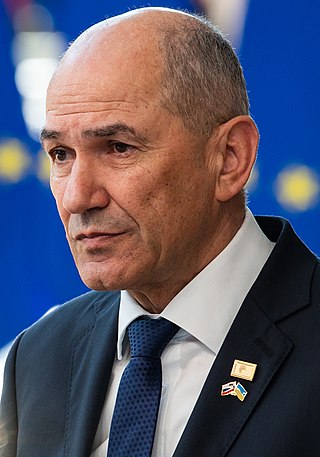
Ivan Janša, baptized and best known as Janez Janša, is a Slovenian politician who served three times as a prime minister of Slovenia, a position he had held from 2004 to 2008, from 2012 to 2013, and from 2020 to 2022. Since 1993, Janša has led the Slovenian Democratic Party, which has emerged as the pre-eminent Slovenian conservative party. Janša lost his fourth bid for prime minister in April 2022, his party defeated by the Freedom Movement party.

Borovnica is a settlement in the Municipality of Borovnica in the Inner Carniola region of Slovenia. It is about 20 kilometres (12 mi) southwest of the national capital Ljubljana.

Jože Pučnik was a Slovenian public intellectual, sociologist and politician. During the communist regime of Josip Broz Tito, Pučnik was one of the most outspoken Slovenian critics of dictatorship and lack of civil liberties in SFR Yugoslavia. He was imprisoned for a total of seven years, and later forced into exile. After returning to Slovenia in the late 1980s, he became the leader of the Democratic Opposition of Slovenia, a platform of democratic parties that defeated the communists in the first free elections in 1990 and introduced a democratic system and market economy to Slovenia. He is also considered one of the fathers of Slovenian independence from Yugoslavia.
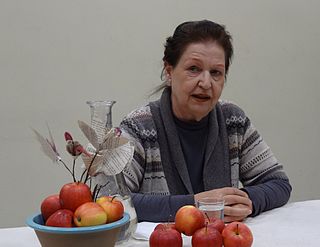
Alenka Puhar is a Slovenian journalist, author, translator, and historian. In 1982, she wrote a groundbreaking psychohistory-inspired book "The Primal Text of Life" about the 19th century social history of early childhood in Slovene Lands, then part of the Austro-Hungarian Empire. The book was in 2010 the subject of a television documentary that was in 2010 televised on the national RTV Slovenija. Her grandfather was the photographer and inventor Janez Puhar, who invented a process for photography on glass.
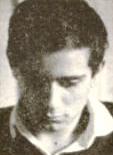
Peter Vodopivec is a Slovenian historian and public intellectual.
Gregor Tomc also known as Grega Tomc is a Slovenian sociologist, musician and activist. In the late 1970s and 1980s, he was the founder and member of the Slovenian punk rock band Pankrti.
Dušan Pirjevec, known by his nom de guerre Ahac, was a Slovenian Partisan, literary historian and philosopher. He was one of the most influential public intellectuals in post–World War II Slovenia.

Pavel Gantar, also known as Pavle Gantar is a Slovenian politician and sociologist. Between 2008 and 2011, he served as speaker of the Slovenian National Assembly. From February 2012 and to their dissolvation in 2015, he has been the president of the social liberal extra-parliamentary party Zares.
Veljko Rus was a Slovenian sociologist, writer and academic.
Jelica Šumič Riha is a Slovenian philosopher, political theorist, and translator, associated with the Ljubljana school of psychoanalysis.
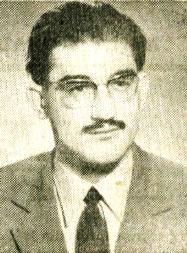
Božidar Debenjak is a Slovenian Marxist philosopher, social theorist and translator.
Kalobje is a village in the Municipality of Šentjur, in eastern Slovenia. The settlement, and the entire municipality, are included in the Savinja Statistical Region, which is in the Slovenian portion of the historical Duchy of Styria.

The Hradecky Bridge is one of the first hinged bridges in the world, the first and only preserved cast iron bridge in Slovenia, and one of its most highly valued technical achievements. It spans the Ljubljanica River in Ljubljana. At the time of its construction, it was praised as elegant, very modern, and economical. Because it was later used to transport the dead from the Ljubljana hospital to the mortuary, it was nicknamed the Mortuary Bridge, but has retained its beauty and technical perfection. Throughout history, both names have persisted.

Edin Osmanović is a Slovenian football manager and former player. He began his career in Rudar Trbovlje and later coached many clubs in the Slovenian PrvaLiga, the highest level in Slovenian football, including Celje, Gorica, Rudar Velenje, Korotan Prevalje, Dravograd, Aluminij, and Mura 05.
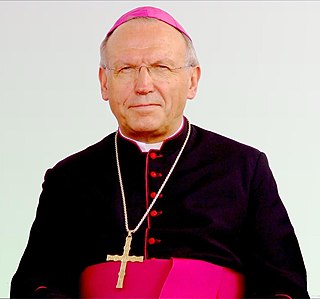
Anton Stres, C.M., was the archbishop of the Roman Catholic Archdiocese of Ljubljana and the metropolitan bishop of Ljubljana as well as the president of the Slovenian Bishops' Conference from January 2010 until July 2013. As Archbishop of Ljubljana he was also the grand chancellor of the Faculty of Theology of the University of Ljubljana.

DOBA Faculty of Applied Business and Social Studies is a private business school located in Maribor, Slovenia. Founded in 2003, DOBA Faculty provides undergraduate and graduate education in economics, business management, marketing and management. A 15-year tradition in online learning makes DOBA one of the leading online business schools in Europe.
Mirt Komel is a Slovenian philosopher, novelist, sociologist, playwright, essayist and translator.

Faculty of Social Sciences is one of the faculties, comprising the University of Ljubljana. It is located at Kardeljeva ploščad.
Primož Repar is a Slovenian poet, writer, philosopher, translator, essayist, editor, publisher and organizer of international cultural and scientific / professional events, workshops, festivals, conferences, symposia, various scientific and professional research, and other initiatives at home and abroad.













